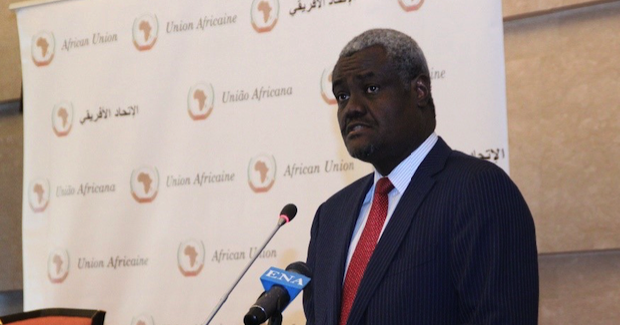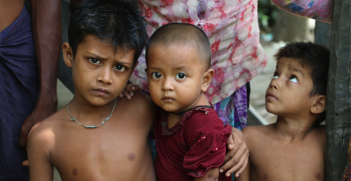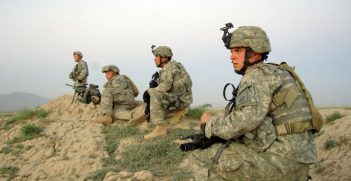New Faces in the African Union

The African Union’s 28th summit, held in Addis Ababa from 22 to 31 January 2017, saw the election of the organisation’s new leadership team while Morocco controversially rejoined the pan-African body after a 30-year hiatus. The summit highlighted ongoing contestation of core African Union governance principles while offering a critique of President Trump’s US travel ban on citizens of three African countries.
New African Union leadership finally elected
AU Commission (AUC) elections were six months overdue after the vote at the previous summit in Rwanda saw no candidate for chairperson secure the requisite two-thirds majority of AU members, a process also conditioned by sub-regional rivalries. The rescheduled vote attracted three additional—and more palatable—candidates, with Chad’s Foreign Minister Moussa Faki Mahamat taking seven rounds to prevail as new AUC chairperson against fancied competitors from Kenya and Senegal.
Mr Faki—a former chair of the AU’s Economic, Social and Cultural Council and a former prime minister of his country—will take up his four-year term at the AUC after a three-month transitional period. Chad has in recent years been proactive in tackling violent jihadism in the Sahel region, including contributions to regional military operations in Mali and, closer to home, against Boko Haram. Mr Faki’s election will likely bring renewed AU focus to the Sahel’s complex challenges.
Mr Faki replaces outgoing AUC Chair Dr Nkosazana Dlamini-Zuma of South Africa—the first woman to hold the position—who declined to run for a second term. She is expected to return home to contest the leadership of the ruling African National Congress and from there the South African presidential elections in 2019, where if successful she would succeed her ex-husband Jacob Zuma.
Dlamini-Zuma’s record at the AUC is mixed following her controversial election in 2012. Her main achievements include producing the AU’s long-term integration and development strategy, Agenda 2063, as well as strongly promoting the rights of women and girls across Africa. Yet she is also accused by critics of being a poor communicator, not leading effectively on a number of key crises and being pre-occupied with South African politics.
At the Summit, Dr Dlamini-Zuma criticised the Trump administration’s 90-day travel ban on citizens from three Muslim-majority AU member states—Libya, Sudan and Somalia—by juxtaposing how “the very country to whom our people were taken as slaves during the Trans-Atlantic slave trade, have now decided to ban refugees from some of our countries”. In this unpredictable era, US-AU relations—particularly regarding trade, migration and counter-terrorism—will involve a difficult but intriguing set of negotiations for Mr Faki and his new AUC leadership team.
Morocco controversially rejoins
The AU’s re-admittance of Morocco as its 55th member state further expands a regional organisation already comprising over one quarter of the world’s states and housing over 1.2 billion people. Morocco had in 1984 withdrawn from the Organisation of African Unity, the AU’s predecessor, in protest at that body’s recognition of the independence of the Sahrawi Arab Democratic Republic (SADR) or Western Sahara—a disputed territory that Morocco annexed in 1975 claiming historical ownership. Western Sahara, a full AU member, is currently recognised by the UN as a non-self-governing territory.
The return of Morocco—the last major non-AU country in Africa—will likely bring much needed additional human and financial resources to the body and will further the AU’s mandate of achieving continental unification and integration. But among some member states the move raised questions about the AU’s commitment to its own principles of supporting the self-determination of colonised peoples in Africa. Ultimately, Morocco’s return was supported by 39 AU members including the SADR government, with the move a potential circuit-breaker in resolving the long-running dispute.
The Gambia and ICC withdrawal
The summit revealed ongoing contestation of other core AU governance principles. The recent political crisis in The Gambia posed a clear test for the African Governance Architecture—the AU’s framework for promoting democracy and potentially coercively supporting democratic transitions of power. Gambian President Yahya Jammeh, in power for 22 years and with a poor governance record, lost the December 2016 election but refused to cede power to winning opponent Adama Barrow. After a tense stand-off, a broken deadline and the swearing in of Mr Barrow in The Gambia’s embassy in neighbouring Senegal, the sub-regional Economic Community of West African States (ECOWAS) succeeded—through a mixture of intense diplomacy and the imminent threat of military intervention—in having Mr Jammeh back down and go into exile, allowing Mr Barrow to assume power peacefully.
The AU and United Nations actively supported this West African-led intervention through the organisational frameworks of subsidiarity and regional integration. Mo Ibrahim, the Sudanese founder of the highly-regarded Ibrahim Index of African Governance, commended these collective actions because they “illustrate the value of meaningful regional integration on our continent”. For the AU, this relative success for its emerging interventionist approach to the promotion of democratic change in Africa is contrasted with a number of other cases across the continent in which such an approach has not been applied robustly or consistently.
The AU Assembly also adopted a non-binding strategy for the collective withdrawal of African states from the International Criminal Court (ICC), following years of tension between the court and a number of African governments who oppose the court’s ability to indict sitting African heads of state. This opposition also undermines the AU’s own stated principles of human rights and accountable governance. Critics also cite the perceived ‘African bias’ of the court as a form of neo-colonialism. One proposed solution to this stand-off is the empowering of a competent AU legal mechanism—which would operate as a median between African states and the ICC—to try international crimes on the continent. While this resonates with the AU’s position of finding ‘African solutions’ to regional crises, it would need to demonstrate a commitment to collectively holding African leaders accountable for their actions—perhaps following the example of the coercive African-led response to The Gambia.
Australia’s AU engagement
For its part, Australia was represented at the Summit by Minister for International Development and the Pacific Islands, Concetta Fierravanti-Wells, who addressed the AU Executive Council’s pledging AU$1 million towards developing a Gender Equality Observatory in partnership with the AUC. As with Labor governments’ courting of the crucial African-bloc of UN votes during the recent campaign for a UN Security Council seat, Ms Fierravanti-Wells was too on a mission to present Australia’s case for a 2018-20 seat on the UN Human Rights Council.
It will be interesting to see if this campaign is as successful, given the relative disengagement from Africa by Coalition governments since 2013. In a global environment in which traditional alliances and alignments are being fractured and potentially redrawn, Australia might be well advised to strengthen its partnerships with African states and regional institutions.
Dr David Mickler is an international relations academic and coordinator of the Africa Research Cluster at the University of Western Australia, Perth. He has also been a visiting scholar at the Institute for Peace and Security Studies at Addis Ababa University, Ethiopia.





